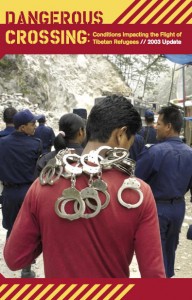 A new report from the International Campaign for Tibet (ICT) finds that the overall situation for Tibetan refugees transiting through and living in Nepal continued to deteriorate in 2003, despite the promulgation of a new written refugee policy by the Nepalese government.
A new report from the International Campaign for Tibet (ICT) finds that the overall situation for Tibetan refugees transiting through and living in Nepal continued to deteriorate in 2003, despite the promulgation of a new written refugee policy by the Nepalese government.
The report concludes that the May 31, 2003 refoulement of 18 Tibetan asylum seekers from Kathmandu was the culmination of several years of worsening conditions for refugees transiting Nepal in flight from repression in Tibet. The 2003 update of Dangerous Crossing: Conditions Impacting the Flight of Tibetan Refugees gives the most detailed published chronology to date of the May 2003 refoulement and the events that followed, including first-hand accounts by refugees who were refouled.
These Tibetans’ testimony of the abuse and torture they suffered shows that our worst fears were realized after these 18 refugees were handed back to Chinese custody,” according to Kelley Currie, Director of Government Relations for ICT and one of the authors of the report. “By their conduct, both the Nepalese and Chinese governments flagrantly violated basic tenets of international law.”
The 2003 update, the third published by ICT, chronicles the international community’s response to the May 2003 refoulement and the resulting moves by the Nepalese government to mitigate international outrage at the collusion between the Nepalese and Chinese governments. The government’s new written policy on refugees was a notable move forward in a year when the overall situation for Tibetans in Nepal continued to grow more precarious. ICT also documented the Nepalese government’s inconsistent implementation of the new policy following its issuance.
Dangerous Crossing: 2003 Update also explores the impact that the growing Maoist insurgency in Nepal is having on the Tibetan refugees. The report looks at how the Nepalese government’s security response to the Maoists impacts the ability of Tibetans to secure safe passage through the Nepalese countryside, as well as the political dimensions of the conflict for Tibetan refugees living in and transiting through Nepal. As Nepal has looked for increased support from China against the Maoists, the Chinese government has become more assertive in pressing Nepal to stop “anti-China” activities on its soil.
“What we are seeing in Nepal right now, particularly in terms of the growing Chinese influence and increasingly aggressive Chinese demands on the Nepalese government, is very ominous,” commented Ms. Currie. “The Nepalese government is trying to walk a fine line with the Chinese. I think their position will grow increasingly difficult, and we are very concerned about the impact on Tibetans living in and transiting through Nepal.”
ICT will be sharing the findings of the new report with policy-makers in the United States, Europe and South Asia, as part of its efforts to ensure that Nepal adhere to its written policy with regard to Tibetan refugees. In particular, ICT will focus on informing congressional leaders of the ongoing problems with implementation of Nepal’s refugee policy since it was transmitted to Senator Dianne Feinstein in August 2003.

